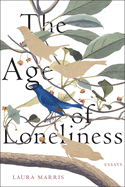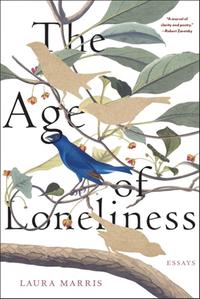
 The Age of Loneliness, the debut by translator and creative writing professor Laura Marris, is a perceptive, moving collection of nine braided essays linking personal experience of loss with illuminating analyses of aspects of the climate crisis.
The Age of Loneliness, the debut by translator and creative writing professor Laura Marris, is a perceptive, moving collection of nine braided essays linking personal experience of loss with illuminating analyses of aspects of the climate crisis.
The late biologist E.O. Wilson coined the term "Eremocene" ("Age of Loneliness") for how the displacement of other animals is leaving people alone on a depleted planet. Disconnection from nature appears here as a modern ailment to which attention and purposeful action are potential salves. In "Lost Lake," Marris mourns the intimacy with the natural world that vanished with her father, who died when she was 19. "Shadow Count" loops back to consider how she might rebuild the childhood knowledge of birdlife he instilled in her by participating in community science projects like Christmas Bird Counts.
"Cancerine" is a strong example of the pairing of personal and environmental concerns. Cancer, the sign of the crab, was her father's cause of death. Horseshoe crabs were ground into fertilizer in the 19th century, and to this day their blood is harvested for biomedical testing. Thus does society advance by treating creatures as commodities.
Roads and skyways, too, prioritize human convenience over other species' survival. In "Vertical Time," Marris contrasts her father's earnest 1984 cross-country road trip with highways' imperiling of animals through habitat fragmentation and roadkill. "Flat-Earthers" warns of the dangers that car culture, including driverless cars, pose to safety as well as to deep familiarity with landscapes.
"Safer Skies for All Who Fly," a standout essay reminiscent of Helen Macdonald's longform journalism, is a devastating exposé of "bird strikes." There were over 15,000 collisions between U.S. aircraft and birds in 2021. A dedicated Smithsonian laboratory identifies the remains, and researchers are developing radar that will help pilots avoid migrating birds.
Bereavement, career, and relationship struggles are threads in multiple pieces. A backdrop of biodiversity loss and the exploitation of nature puts such private matters into perspective, but never negates their gravity. Marris endured a long-distance relationship; even once she had settled with her husband in Buffalo, N.Y., she continued commuting to Boston by plane. "The Echo," in the vein of Terry Tempest Williams's work, investigates ongoing ecological and health problems near Buffalo's Love Canal, a toxic-waste dump site.
Driven by curiosity and environmental conscience, these reflective essays ponder human responsibility and resilience. Fans of Cal Flyn and Lyanda Lynn Haupt can read them and feel less alone. --Rebecca Foster, freelance reviewer, proofreader and blogger at Bookish Beck
Shelf Talker: Laura Marris's affecting debut essay collection weaves together personal experiences of loss and loneliness with the wider environmental worries of the "Eremocene."

